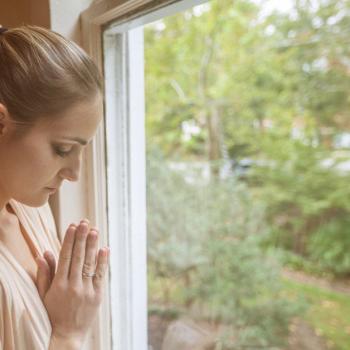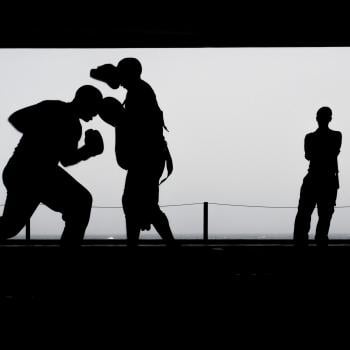And anyway, I don't have a dog.
But is this what Christians are called to model? No, the tradition tells us, it absolutely isn't. We are called to love our neighbor no matter who or where, called to the healing of a broken world, and called to model our lives on those of Jesus, who loved even those who were killing him.
Thus, we Christians must be the ones to somehow rise above the Mad-as-Hell narrative, the discourse Rowan Williams described to me last week as our "addiction to high-octane violent language."
In a world filled with violent and hateful rhetoric, Christians are called to give up such language cold turkey and to do the hard work of reconciliation, as the Apostle Paul put it in a letter to the church in Corinth:
So if anyone is in Christ, there is a new creation: everything old has passed away; see, everything has become new! All this is from God, who reconciled us to himself through Christ, and has given us the ministry of reconciliation; that is, in Christ God was reconciling the world to himself, not counting their trespasses against them, and entrusting the message of reconciliation to us. So we are ambassadors for Christ, since God is making his appeal through us; we entreat you on behalf of Christ, be reconciled to God. For our sake he made him to be sin who knew no sin, so that in him we might become the righteousness of God. (2 Corinthians 5:17-21, NRSV)
The ministry of reconciliation is what our culture most needs now—a ministry of mature discourse that reminds people that however much we may differ from each other, we are all Children of God, and we must love each other. We must. Not just because we're called to, but because when we do, beautiful things happen.
Because when we do, the world breaks open into all the colors of the rainbow.
A couple of weeks ago in my twin identities as Baylor professor and Episcopal lay preacher, I co-led a week-long preaching retreat for Baptist pastors. Some of our pastors were wildly progressive, some moderate, some so conservative that I could close my eyes and hear my grandma praying. We differed radically in theology, in attitudes toward the culture, in the ways we read the Bible, in worship preferences, and in liturgical practice. Our pastors were old men and young women, black and white, Southerners and Northerners. In most situations in our culture, even in our Christian culture, we would have been, at best, unable to communicate, and at worst, slinging invective and condemning our differences.
But as often happens when people spend time worshipping and fellowshipping together, something happened. We prayed together and for each other. We shared meals with each other. We learned to see Christ even in the radically different lives and ministries of those across the theological aisle from us. We accepted and came to celebrate the fact of our differences, we listened to each other, and we learned from each other.
We closed our time together with a service of communion. That morning, I looked around the room, and as I observed my Baptist pastors passing the Peace of Christ, I realized that we loved each other, and that, however much we differed, we could no more hate each other than we could hate ourselves.
Augustine's two-fold commandment to love crops up again and again in his writing, but nowhere does he put it as simply as he does in On Christian Doctrine: "Whoever, therefore, thinks that s/he understands the divine Scriptures or any part of them so that it does not build the double love of God and of our neighbor does not understand it at all."
If we are not loving each other, all our knowledge of the Bible, or of whatever field of Christian knowledge, is as clanging brass.
And only love, that radical call that is at the heart of everything we do as Christians, can help us to, as President Obama said in Arizona, talk with each other in a way that heals.
Only love will permit us to see the face of God even in our neighbor who does not act, pray, or live as we do.
Only love will encourage us even in hard times to be the leaven of a society that needs to rise, the magnetic force working to reconcile opposing factions with each other.
So yes, brothers and sisters: What the world needs now is love.
And what love looks like is you and me.





